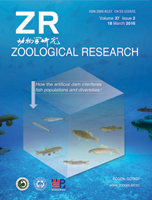
|
Zoological Research
Kunming Institute of Zoology, Chinese Academy of Sciences
ISSN: 2095-8137
Vol. 30, No. 4, 2009, pp. 389-395
|
 Bioline Code: zr09058
Bioline Code: zr09058
Full paper language: English
Document type: Research Article
Document available free of charge
|
|
|
Zoological Research, Vol. 30, No. 4, 2009, pp. 389-395
| en |
Role of Specific Synaptic Plasticity Interfering Peptides in the Expression of Morphine Induced Conditioned Place Preference in Mice
Wu, Kun; Xu, Lin & Huang, Jing-fei
Abstract
Learned association between context and drug abuse is essential for the drug conditioned place preference (CPP), which is an animal model widely used to measure drug reward. Synaptic plasticity, in the form of long-term potentiation (LTP) and depression (LTD), is regarded as a proposed cellular substrate of learning and memory. However, the exact role of LTP/LTD in addiction is not known yet. Therefore, by bioinformatics we designed peptides aiming to interfere with LTP and LTD respectively, to study their individual role in the expression of morphine CPP. We found that the interfering peptide Pep-A2 can specifically block hippocampal LTP in CA1 region, whereas Pep-A3 can block LTD in this region. Treatment of either of their cell penetrating forms (Tat-A2 or Tat-A3) before test can block the expression of Morphine CPP in mice. These results suggested that both LTP and LTD are required in the drug-associated learning and memory
Keywords
LTP; LTD; Reward; CPP
|
| |
© Copyright 2009 Kunming Institute of Zoology, the Chinese Academy of Sciences
Alternative site location: http://www.zoores.ac.cn/
|
|
